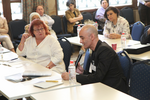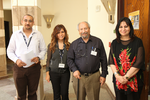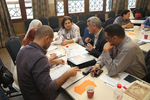
Next Generation Leadership for Egypt
Abstract
The mass movement which led to the overthrow of former Egyptian president Hosni Mubarak signaled desire of many Egyptians not only for a change of government, but also for a generational change in the country's power structures. The protestors were, to a great extent, much younger than the political leaders whom they opposed. Their non-violent struggle for freedom and dignity showed courage, commitment, and great ingenuity despite the fact that few had previous experience as leaders. Now, Egypt's political and economic challenges demand that these young people take up positions of leadership quickly, capitalize on their positive qualities, learn from their mistakes, and benefit from the experiences of their peers at home and abroad.
The energetic camaraderie of Tahrir is needed more than ever in this phase of democratization, political party development, slowed economic growth, and general instability. A new generation of leaders from every walk of life must mobilize their communities, take entrepreneurial risks, and organize toward political and social goals. But what environment is needed to encourage such action? What tools and knowledge do these new leaders need to become successful agents of change? What can be learned from the old regime and avoided in the future? The reform process must be owned and driven by Egyptians, but if local capacity is lacking, what role is it appropriate for other regional or international actors to play in responding to requests for advice or assistance emanating from Egyptian civil society? Change naturally involves risk, but how can young leaders protect themselves and mitigate the significant personal risks associated with radical change? Finally, in terms of managing expectations, how can the strong demand for progress in the short term be balanced with a commitment to solutions that will best provide for Egypt in the long-term?
In its 65 year history, the Salzburg Global Seminar has pushed developing leaders to take up such challenges in collaboration with like-minded peers from around the world. As a response to events in the Middle East and North Africa last year, the Seminar launched a series of programs focused directly on the region's transition. This Fellowship event now seeks to take into the region the work begun in Salzburg in 2011, especially that of the December session, "The Challenges of Transition: Sharing Experience".
Run in collaboration with the American University of Cairo, this seminar will capitalize on the networks of both host organizations to focus on lessons for meeting challenges to progress in the public sector, private sector, and civil society. At the same time it will provide participants with a forum to outline further opportunities for societal progress and personal development. Salzburg Global Fellows, their recommended guests, and all those with an interest in Egypt's future are encouraged to attend.
 |  |  |
Faculty























































































